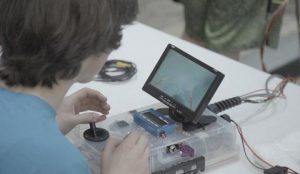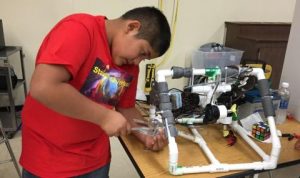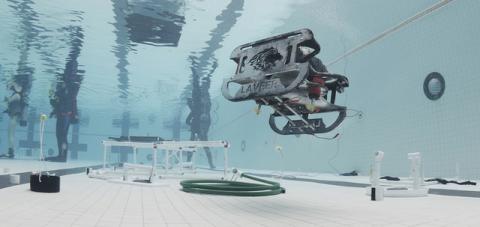By Tiffany Woods, Oregon Sea Grant program
LINCOLN CITY, Ore. – About 150 students in Oregon and Washington from elementary school through college will compete in Lincoln City on April 20 in an underwater robotics contest that tests their engineering and problem-solving skills. The 27 teams, which hail from 13 schools or organizations in 14 towns, will be showing off the remotely operated vehicles – or ROVs – they built for the annual MATE Oregon Regional ROV competition. The event is funded by Oregon Sea Grant and the Oregon Coast STEM Hub and aims to prepare students for technical careers.
The public is invited to attend the contest, which will be held from 9 a.m.- 5 p.m. in the swimming pool and gym at the Lincoln City Community Center at 2150 N.E. Oar Place.
The Oregon teams come from Albany, Astoria, Beaverton, Corvallis, Lincoln City, Newport, The Dalles, Tigard, Tillamook, Toledo and Warrenton. The Washington teams are from White Salmon. The college students are from Oregon State University and Linn-Benton Community College. Teams are divided into four categories based on skill and grade level.

The event is one of 38 regional contests around the world that are coordinated by the California-based Marine Advanced Technology Education (MATE) Center. The top high school and college teams will qualify to compete in the MATE International ROV Competition, which will be held June 20-22 in Kingsport, Tenn.


Students are tasked with creating mock companies, building a robot for a hypothetical client, and thinking like entrepreneurs to market their products. They gain project management and communication skills as they manage a budget, work as a team, brainstorm solutions and deliver presentations.
Each year a new theme is chosen. This year’s contest highlights the role of ROVs in ensuring public safety, maintaining healthy waterways and preserving historical artifacts. The students must guide their devices through tasks that simulate inspecting and repairing a mock hydroelectric dam, monitoring water quality, restoring habitat for fish and recovering a hypothetical cannon from the Civil War. The latter task is only for the upper two levels. Students will also present marketing displays they created and give presentations to judges about how the built their device.
The judges and volunteer divers come from Oregon State University, the National Oceanic and Atmospheric Administration, the Environmental Protection Agency, the Oregon Department of Fish and Wildlife and the Oregon Coast Aquarium. The MATE Center, the Marine Technology Society, the Association for Unmanned Vehicle Systems International, and The Sexton Corporation also support the competition.
The contest is one of many events offered by the Oregon Coast STEM Hub and Oregon Sea Grant to develop Oregon’s future workforce by helping students increase their competency in science, technology, engineering and math.


.png)